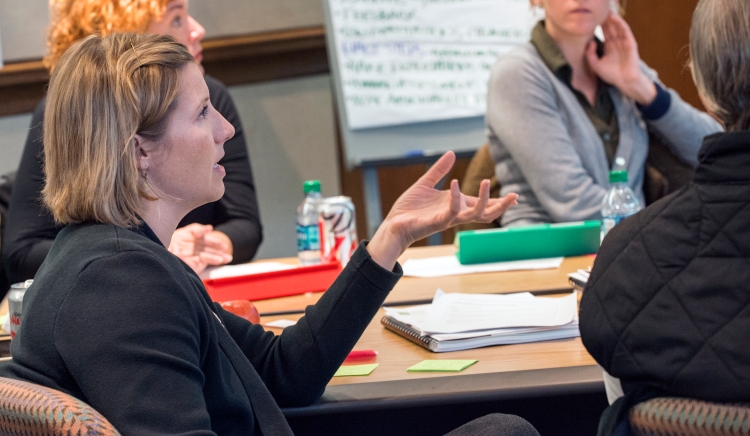
By
Now in its third year, the Lynch Leadership Academy has added a new program that’s preparing educators to become principals through an intensive, yearlong immersion in school leadership.
The Aspiring Principals Program (APP) is built around a model similar to the Lynch Leadership Academy’s cornerstone program, which offers a one-year leadership development program to approximately 20 principals from Boston Public Schools (BPS), charter and Catholic schools.
Academy Director Thaly Germain said leadership development and collaboration across the three education sectors are at the core of the APP program. The program participants are mentored by the principals at the schools where they work, assigned executive coaches from the private sector and taught by BC leaders and experts in the fields of education, management and leadership.
“The aspiring principals are essentially leading a small portion of their school for the year and their school principal serves as a coach and mentor,” said Germain. “Each fellow is also working with two executives from the Boston area who help them build executive skills like project management, people management and marketing and branding. That’s a new level of support.”
The new program is funded by a $1.5 million grant from Carolyn A. and Peter S. Lynch ’65 through the Lynch Foundation, and run by the Academy, which is affiliated with the Carroll School of Management and the Lynch School of Education.
Launched in 2010 through a gift from the Lynches, the academy has established a new leadership development model for school leaders from district, charter, and Catholic urban schools. Germain said working with educators who want to become principals was a logical extension of the program.
The inaugural APP group is Emily Bozeman, Eliot K-8 School (BPS), North End; Robby Chisholm, Mather School (BPS), Dorchester; Pauline Lugira, Dever/McCormack Middle School (BPS), Dorchester; Samantha Varano, Thomas A. Edison K-8 School (BPS), Brighton; Megan Webb, Orchard Gardens K-8 School (BPS), Roxbury; Aliece Dutson, Mission Grammar School, Mission Hill; and Katharine Needham, Match Community Day Charter School, Jamaica Plain.
Some members of the group – Dutson, Varano and Needham – are already assistant principals. The others, all veteran teachers, are serving as leadership fellows in their schools for the year.
Germain said all members are being prepared to run “autonomous” schools that give principals bold mandates to drive school improvement. Even BPS candidates are being prepared to run the city’s pilot schools, which function in a similar fashion to independent public charter schools.
The APP cohort attended a 10-day summer institute and meets together twice a month on campus and at school sites. The participants traveled to Chicago last month for three days of collaboration and school visits with Chicago educators. At the close of the program, each member will have prepared a school design plan – a leadership blueprint for an effective school – and receive principalship certification. Each participant agrees to lead an urban school for at least three years.
Lugira, who has worked in private, charter and public schools during her 12-year career, said she’s been impressed with the program’s focus on executive leadership in areas from budgeting and fundraising to marketing and branding.
“I’ve never had the opportunity to be coached for leadership development,” said Lugira. “This is an opportunity to learn by interacting with colleagues in a similar situation. The guidance and support from the Lynch Leadership Academy is tremendous.”
Dutson, a nine-year educator now in the Archdiocese of Boston’s Mission Grammar School, said working with educators from public district and charter schools has given her a solid network of supporters.
“Something Thaly has pushed us to think about is the power we have as a cohort,” said Dutson, whose principal mentor, Maura Bradley, was part of the Academy’s first cohort. “If something is getting in our way, or in the way of our kids, we can work together to overcome that to the benefit of the kids – not just in the school I’m in, but in schools across the entire city.”



